
Hywel Dda University Health Board Green Team Competition anticipates annual saving of £26,398.562 and 2,340,950kgCO2e
The NHS Wales Decarbonisation Strategic Delivery Plan, launched in March 2021, sets out NHS Wales’ plan for addressing the climate emergency declared by Welsh Government in 2019.
This year, Hywel Dda University Health Board selected six teams to participate in our Green Team Competition. Each team was supported by CSH to develop, run, and measure projects that add sustainable value to their service by considering the "triple bottom line". We are pleased to share that these projects have projected annual savings of £26,398.562 and 2,340,950 kgCO2e, which is the carbon equivalent of what 92,638 mature trees would absorb in a year, or 6,742,367.5 miles driven in an average car.
The teams presented their projects virtually to a judging panel, prior to coming together to celebrate their achievements at the in person Showcase and Awards event. The judging panel consisted of:
- Lisa Wise, Head of Health and Social Care Climate Emergency National Programme, Welsh Government
- Steve Moore, Chief Executive, Hywel Dda University Health Board
- Dr Hayley Pinto, Education and Training Lead, Centre for Sustainable Healthcare
The Green Team Showcase and Awards event took place at The Waterfront Museum in Swansea Bay, and was held jointly with the Hywel Dda Green Team Competition.
CSH would like to thank Sarah Thorne, One Health Practitioner (Hywel Dda) and Hayley Beharrell, Sustainability Planning Manager (Swansea Bay) for their planning and hosting of this event.
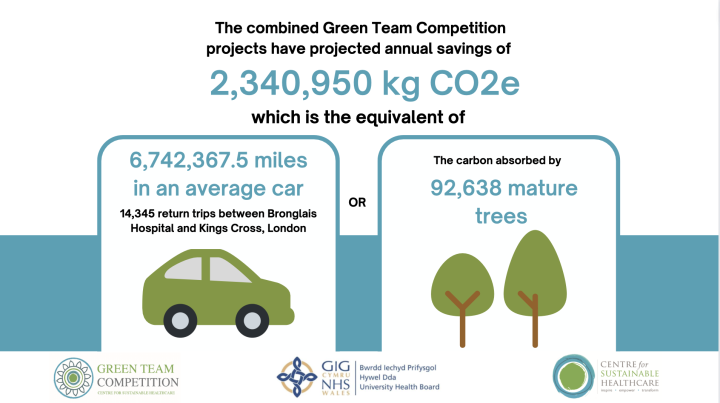
Read the full Impact Report here.
Green Team Competition Projects
1. Pathology Sample Transport, Pathology Team
2. Reducing The Inhaler Blues, Medicines Optimisation Team
3. Local Supply Chain Initiative, Hywel Dda Frontline Procurement Team
4. Diverting nappy/incontinence waste from deep landfill to the recycling waste stream, Environment Officer Team
5. Reducing plastic bag usage in Bronglais Hospital Pharmacy Department, Pharmacy Team
6. Transfer sheets in Endoscopy, Endoscopy Team
1. Pathology Sample Transport, Pathology Team
There are four blood science laboratories in Hywel Dda University Health Board (HDUHB) and each process most of the samples sent to them, however, some require analysis at another hospital site or specialist center. The routine transport between hospital sites for these tests produces 52.4 tonnes of carbon emissions, with 119,500 miles travelled per year.
There are some cases when samples are sent via an urgent form of transport (taxi) as they cannot wait for the next day routine collection. These ad-hoc requests are for transport of pathology samples and blood products between hospital in Hywel Dda University Health Board, as well as to locations in other health boards. The secondary locations, outside of the health board, are the specialist centres for testing.
Team members:
John Markham; Huw Davies; Susan Prosser; Lee Peters
Method & Impact
The team have investigated if all ad-hoc ‘urgent’ transport is in fact clinically urgent, and are aiming to reduce ad-hoc transport by completing team education and reviewing in-house versus external testing options. An audit was conducted, and the team anticipated that a 5-10% reduction in the next 12 months was reasonable and achievable.
The team calculated that a 5-10% reduction in ad hoc travel and associated emissions, gives a potential annual saving of 1,950-3,901 kg CO2e, equivalent to 4,678-9,355.5 miles driven, and up to £10,367.
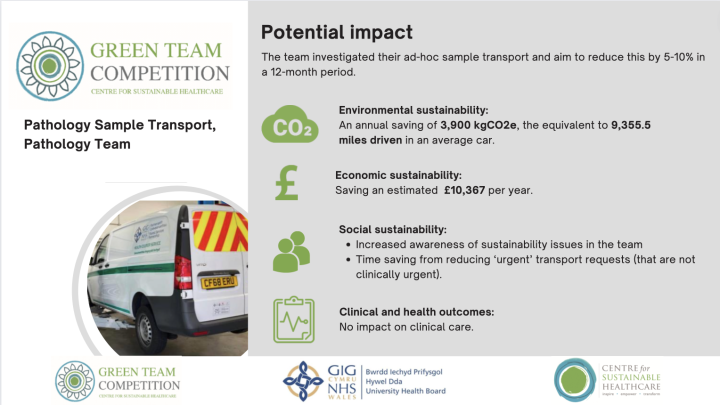
2. Reducing The Inhaler Blues, Medicines Optimisation Team
Wales has an ambitious target to reduce the proportion of metered dose inhalers (MDIs) from 70% to less than 20% by 2025, which, if achieved will reduce the amount of CO2 equivalent (CO2e) released into the atmosphere by 45,000 tonnes each year.
Team members:
Lowri Davies, Pharmacists; Lowri Jones, Pharmacists; Mair Davies, Pharmacists; Rebekah Rogers, Pharmacists; Sian Jenkins, Pharmacy Technician
The team also recognise the co-operation from the Borth Surgery team.
Method & Impact
The team developed two work streams to reduce the carbon footprint of MDI inhalers being prescribed:
Work stream 1: Low carbon inhaler switch
- Changing the Ventolin® and generic Salbutamol inhalers from high carbon MDIs to Salamol®, a lower carbon MDI.
- Reduce the number of inhalers issued per repeat to 1 as per practice request.
During the project period, the team estimated 18,692 kg CO2e and £248.58 could be saved. If this switch was continued across the health board, 2,249,053 Kg CO2e saved per year. This is equivalent to 6.4 million miles driven in an average car.
Work stream 2: Reducing exacerbations
Contacted the patients at increased risk of respiratory exacerbations due to prescriptions, to attend a respiratory review. The aim was to reduce the number of SABAs being prescribed, reduce GP and hospital visits due to poor respiratory disease management, provide better quality of life for the patient, and potentially reduce their carbon footprint by changing their inhalers to either lower carbon MDIs or to DPIs. During the project period, the team anticipated savings of 1,436.34 kgCO2e, and £6.84.
Overall, the project has an estimated annual savings of 20,182 kgCO2e for the GP practice and 2,249,053 kgCO2e Health Board wide, the equivalent of 6.4 million miles driven in a car, and £7,500 per year.
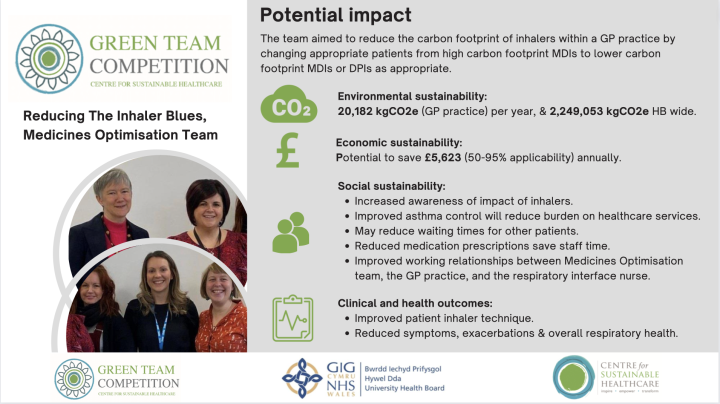
3. Local Supply Chain Initiative, Hywel Dda Frontline Procurement Team
Hywel Dda’s Procurement team have a long term aim to increase their use of local contractors. For the competition, they identified a single contract as a pilot to measure the sustainable outcomes available through local suppliers.
The Glangwili General Hospital automatic door annual contract was selected as it was due for renewal. This hospital has numerous automatic doors across its site that are in place for safety reasons. They ensure that the flow into certain areas is restricted for clinical, infection control and safety reasons. At present with the current supplier based in Bristol, it can take a number of days before the doors can be repaired. This means the doors are often either jammed shut or jammed open. This has a serious effect as it opens up a restricted area which could cause both security and infection control problems. Alternatively, if a door is jammed shut the porters/patients need to take an alternative route causing delays and congestion within the hospital is other areas.
Team members:
Gemma Deverill, Assistant Head of Procurement; Lewis Wells, Procurement Business Manager; Miles Thomas, Data Analyst
Method & Impact
The Glangwili General Hospital automatic door annual contract was selected as it was due for renewal. This hospital has numerous automatic doors across its site that are in place for safety reasons. They ensure that the flow into certain areas is restricted for clinical, infection control and safety reasons. At present with the current supplier based in Bristol, it can take a number of days before the doors can be repaired. This means the doors are often either jammed shut or jammed open. This has a serious effect as it opens up a restricted area which could cause both security and infection control problems. Alternatively, if a door is jammed shut the porters/patients need to take an alternative route causing delays and congestion within the hospital is other areas.
The previous suppliers were making a round-trip journey from Bristol to Carmarthen (230 miles) 49 times per year, added up to 3,405.4 kg CO2e. By switching to a more local supplier the annual CO2e emission dropped to 2,072.85 KG per year. This is a saving of 1,332.55 kgCO2e per year, the equivalent to 3,838 miles driven in an average car, and £30,000.
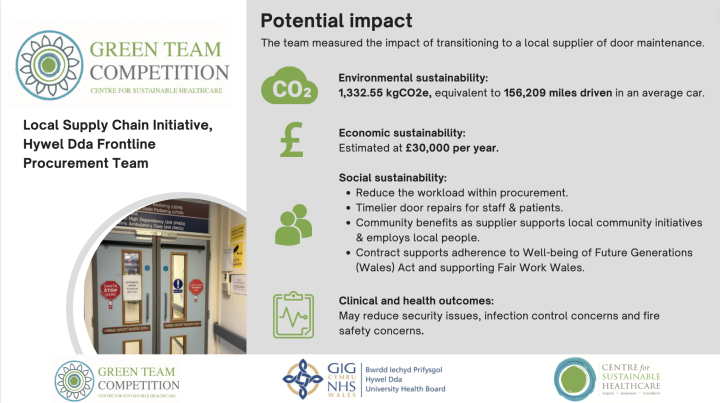
4. Diverting nappy/incontinence waste from deep landfill to the recycling waste stream, Environment Officer Team
Within the Health Board, the Environment Team has a remit for waste management, and leads on implementing processes to improve recycling and reduce overall waste. Disposable nappies/incontinence waste has the capability of being recycled and is already recycled in the community. However, The Health Board (HB) currently sends hygiene/tiger stripe waste to deep landfill. This has a greater carbon emissions impact than if it were to be diverted to the recycling waste stream.
There is little data available, however it has been estimated that circa 58% of hygiene/tiger stripe waste is made up of incontinence waste including nappies. Recycling of this waste could therefore be increased significantly, leading to environmental benefits to the Health Board
Team members:
Terri Shaw, Senior Environmental Officer; Rachel Davies, Environment Officer; Sandra Pegram, Louise Hughes, Diane Lewis and all SCBU staff; Nolan Hunt, Emrys James, Dafydd James, Glangwili Hospital Hotel Services/Waste Porters
Supported by: other Environment Team members; Catherine Williams, Infection Prevention and Control Nurse; Claire Rawlinson, Quality Improvement Practitioner; Llyr Lloyd, Senior Public Health Practitioner
Method & Impact
For their project, the team trialed nappy and incontinence waste recycling at departmental level in the Special Care Baby Unit (SCBU). SCBU have on average 13 babies in the unit at any one time and each baby uses on average 7 nappies a day. This equates to approximately 33,124 disposable nappies, or 5.5 tonnes of hygiene waste being generated from this ward alone per annum. If recycled there is a potential to reduce carbon emissions from this nappy/incontinence waste stream in the department by 74%. This is a reduction of 1,810.19 kgCO2e per year.
If this change was spread across the health board, it could lead to savings of 82,821.964 Kg CO2e. However, it would cost an additional £22,000 to recycle this waste stream rather than send it to deep landfill.
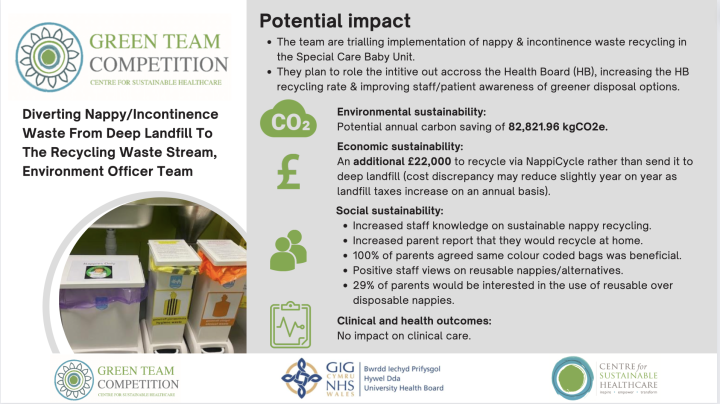
5. Reducing plastic bag usage in Bronglais Hospital Pharmacy Department, Pharmacy Team
One of the targets in the NHS Wales Decarbonisation Strategic Delivery Plan 2021-2030 is to develop a 'plastics in healthcare' initiative to address waste in the delivery of health care. This will aim to tackle PPE, single use plastics, and packaging waste.
Within their pharmacy department, the standard operating procedure (SOP) for delivering medication from the pharmacy to patients on the wards involves packaging every patient’s medication into plastic bags. The pharmacy department orders approximately 7,000 plastic bags per year for this purpose, costing the department around £377 each year. Only a small proportion of these plastic bags are returned to the department for re-use.
Team members:
Zoe Kennerley, Pharmacist; Farah Reaney, Pharmacy Technician
Method & Impact
The team reviewed the method for transporting medications to patients on the wards from the pharmacy department to reduce the number of plastic bags used.
After studying the system, the team identified that medications were already individually labelled with patient details, so the plastic bags were unnecessary. The team opted instead to place all medications taken to the ward in a reusable bag with a ‘return to pharmacy’ label.
The project has an estimated annual savings of 117 kgCO2e, the equivalent of 337 miles driven in a car, and £248.56.
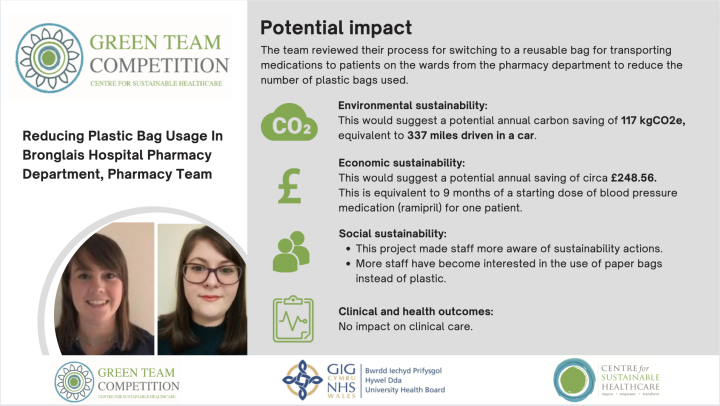
6. Transfer sheets in Endoscopy, Endoscopy Team
A Green Endoscopy group was developed to look closely at pathways, usage of equipment, waste, perform waste walks and many others. The team has identified an area of improvement within one unit is the usage of slide sheets for each patient. 3 of 4 remaining units were using laundry department in order to wash sheets, so they can be re-used. One unit continued to use single use patient transfer sheets for all patients attending the unit regardless of how mobile the individual was. This was an opportunity for improvement.
Team members:
Sr Emilia Wronska Endoscopy Pre-assessment and JAG Lead
Method & Impact
The team aimed to reduce unnecessary use of single use slide sheets, and replace remaining necessary slides sheets with a reusable alternative.
The team has been liaising with Procurement, Laundry Department, and Manual Handling. However, it has not been possible to implement the change in the 10-week project timeframe. The CO2e of a disposable single use patient transfer sheet is 1.38 kgCO2e per sheet. The team estimated that 90% of slide sheet use (2,700 sheets) is not needed clinically. This will lead to potential savings of 3,726 kgCO2e per year, the equivalent of 10,731miles driven in an average car, and £2,160.
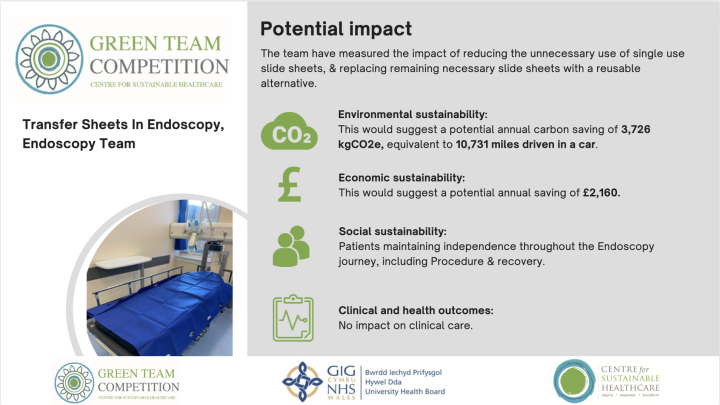
Awards
 On February 3rd, Hywel Dda and Swansea Bay University Health Boards co-hosted the Showcase and Awards Ceremony at The Waterfront Museum in Swansea Bay.
On February 3rd, Hywel Dda and Swansea Bay University Health Boards co-hosted the Showcase and Awards Ceremony at The Waterfront Museum in Swansea Bay.
The Procurement team were announced winners of the Hywel Dda University Health Board Green Team Competition. The Health Board selected two joint highly commended projects – the Medicines Optimisation team and the Environment team.
The outstanding results of the competition once again demonstrates that running the competition creates strong interdisciplinary relationships between clinical and non-clinical departments. Staff also reported feeling both valued and empowered to make further changes in their teams and service and to advocate for sustainable healthcare practices.

